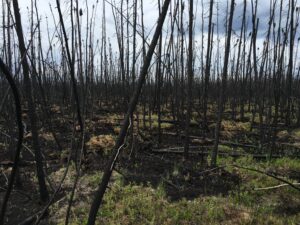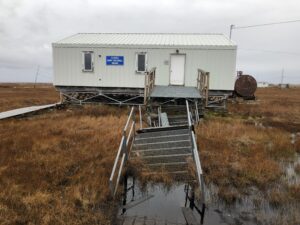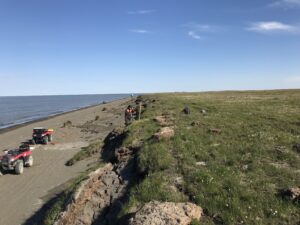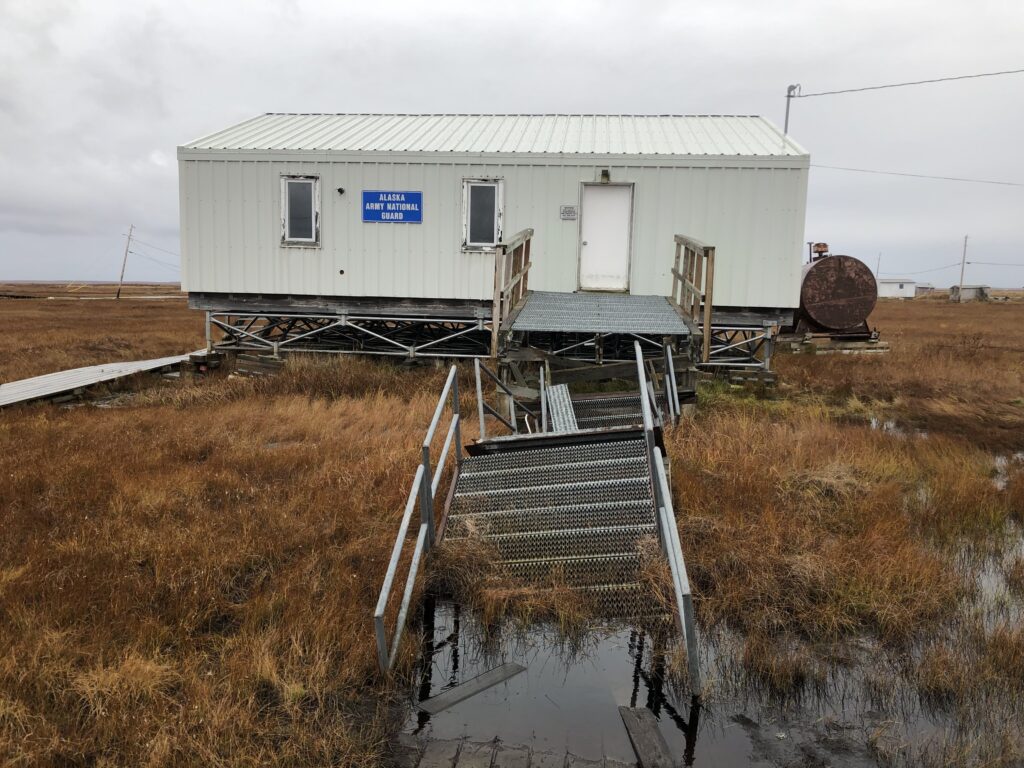Record India heatwave raises power cut fears
High March and April temperatures send air-conditioning demand soaring, heightening coal shortage

A record-breaking “heat dome” across north-west India has worsened a severe shortage of coal for power generation and raised the risk of blackouts at hospitals in New Delhi, according to government statements. The heatwave, which has pushed temperatures to more than 45C in places, is forecast to worsen this weekend and ease after May 2, according to the India Meteorological Department.
Read more in the Financial Times.
Are Alaska’s streams getting too hot for salmon?
A brutal summer spurs new research into heat stress in Chinook salmon
 Madeline Lee’s first year on the Ninilchik River was the year the salmon went belly up.
Madeline Lee’s first year on the Ninilchik River was the year the salmon went belly up.
Lee had just joined the Alaska Department of Fish and Game, helping count fish on their way up the river. It was her first time ever working with salmon, but even so, she could tell something wasn’t right with them.
“Their behavior seemed strange to me,” she recalls—they swam lethargically, rather than surging upstream. Veteran Fish and Game techs agreed and hypothesized it was the warmer-than-usual weather.
Then reports started coming in from other rivers. Across the state that summer, locals were reporting dead salmon in the water, stranded on the gravel shallows, and washed up on the banks.
A team of scientists working on the Koyukuk River tallied 850 dead in that system alone. The true total was likely greater, as fish corpses normally sink and decompose out of view. But the real cause for alarm was the fact that, when the fish were cut open and examined, they were full of eggs. Their several-hundred mile return journey to their birth rivers had ended just short of the finish line, without depositing the eggs that would grow a new generation. Across the state of Alaska, more than 100 different places saw early salmon mortality during the summer of 2019.
2019 broke Alaska’s all time temperature records
“Warmer-than-usual” may be an understatement. 2019 broke Alaska’s temperature records with an all-time high of 90 degrees Fahrenheit—resulting in nearly 80 degree stream temperatures. Most Pacific salmon species surpass an acceptable temperature threshold between 60 and 70 degrees. Above that they become stressed, behave abnormally and, eventually, die.
Sue Mauger is Science & Executive Director of Cook Inletkeeper, an NGO that protects the Cook Inlet watershed, which includes the Ninilchik River. She is also a part of an interdisciplinary project led by Woodwell Climate Associate Scientist Dr. Anna Liljedahl that will gather data on salmon for use in policy decisions on the Kenai Peninsula. Mauger has made her career out of studying water temperatures in Alaska’s streams. In 2002, she dropped her first temperature logger into a stream out of curiosity. The results—70 degrees Fahrenheit—were even surprising then.
Since then, she’s been wading through rivers, compiling data on how water temperatures have been changing. From 2002 onward, “we’ve had more warmer summers than not,” Mauger said. “And then we hit 2019, which is one we will probably talk about for most of our careers now.”
Mauger had previously conducted a five-year temperature study on Cook Inlet salmon streams and used the data to predict water temperatures 50 years into the future. Temperatures in 2019 exceeded them.
“We suddenly jumped so far ahead into the future compared to what we thought we would see,” Mauger said. And the consequences of that jump were made clear when salmon started dying with their eggs still inside them.
Salmon and people have a 12,000-year-old relationship in Alaska
Alaska and salmon are more than interconnected—they are synonymous. So if salmon runs are in jeopardy, many Alaskans believe Alaska is too.
Salmon start their lives as minuscule hatchlings, sheltering and feeding in the gravel beds of small streams before moving downstream to larger habitats as they grow. Once they’re large enough to hold their own, they leave their birth streams for the open ocean.
After a few years at sea, adult salmon return home to the precise streams where they were born. Navigating using the Earth’s magnetic field and a strong sense of smell, salmon surge up streams en masse in the summer, climbing waterfalls—avoiding hungry bears, eagles, and humans—fighting for the chance to mate and lay their eggs in the gravel shallows.
Salmon’s return migration has been foundational to Alaska Native cultures for 11,800 years. Indigenous peoples continue to steward the resource to maintain healthy populations in their home streams. For tribes, salmon is part of their individual and cultural identities—both a sacred fish and a subsistence food source. Salmon hauled in during the summer are smoked and dried to sustain communities through the winter.
Alaska’s economy also revolves around salmon. The seafood industry created $5.6 billion in economic activity for the state in 2017 and 2018, and salmon comprised the majority of that value. From commercial fisheries to sportfishing to salmon tourism, Alaskan businesses depend on the salmon completing their life cycle each year, which is why the egg-carrying corpses of 2019 had a rippling impact across the state. If you hadn’t been paying close attention to salmon before, you were now.
‘Chaperone’ protein acts as a hidden signal of heat stress
Dr. Vanessa von Biela had been paying close attention to the salmon. As a research fish biologist at the United States Geological Survey’s Alaska Science Center, she was working on a paper about heat stress signals in salmon when the 2019 heatwave hit and made her research more pressing.
“It was a weird mix of emotions. I was scared to see change that fast but also it was a relief that somebody other than me was going to know that it was a problem,” Dr. von Biela said.
It also raised a lot more questions—is there a sharp temperature threshold after which heat stress overtakes salmon, or is it a gradual decline? How resilient is the system to high-temperature years? What would a warmer future look like for salmon?
Lee is now earning her master’s degree at the University of Alaska, Fairbanks with guidance from Dr. von Biela, hoping to answer some of those questions. Her research is part of Woodwell’s salmon project. For the past two summers, Lee has been tagging salmon and taking tissue samples to create a reference for how the fish are responding to changing temperatures.
She’s doing this by searching for a specific protein in the tissue of the fish, colloquially called “the chaperone” but scientifically referred to as Heat Shock Protein 70. When salmon get too warm, parts of their cells fall apart, breaking down normal functions. The chaperone binds to parts of the cell to keep them together and functioning in the cell.
It’s meant to carry the salmon through warm days until they can get to cooler waters, but it’s not a permanent adaptation.
“If you’re hot and you turn on a fan, it can make a difference for a while. It can be the difference between you being comfortable and you being uncomfortable,” Dr. von Biela said. “But at some point, it doesn’t matter how high the fan is going, you’re just hot. And all of a sudden you’re uncomfortable again.”
At some point, the energy required to produce the emergency protein, combined with their body’s high demand for oxygen in warmer water, simply overwhelms the fish’s energy reserves. Add to that the fact that spawning salmon are already pushed to their physical limits during migration. They stop eating and dedicate all their remaining energy to pushing their way upstream and developing eggs. The rising heat hits them at the worst possible time.
Keeping Alaska’s waters cold
Salmon’s continued success in Alaska hinges on the ability to keep streams cool, even as the climate warms. And managing stream temperature relies on managing the land around it.
Streams and rivers in Alaska can get their water in one of three ways—fed by some combination of rain and snow, groundwater, or melting glaciers. Rainfed streams tend to be warmer, fluctuating with daily air temperatures. Glacial streams actually get colder on hotter days as more ice from the melting glacier gets flushed downstream. Over time, this diminishes the glacial ice available to cool downstream reaches.
Groundwater-fed streams, however, take on the average annual air temperature of a region. On both warm and cold days, the water temperature remains consistent. Mauger has been working with thermal imagery to track down groundwater sources that feed salmon streams on the Kenai Peninsula. Protecting them could give spawning salmon a needed boost.
“Think of them as little cold water faucets along the stream channels. Those places will become increasingly important as adult salmon come back up the stream. It can use these cold water stepping stones to get its way up to the spawning beds,” Mauger said.
These faucets can be anywhere—crossing state, federal, tribal, and private land, which makes protecting them a complicated task. It’s a problem that conservationists run into at every stage of the salmon’s life cycle, notes Kenai Peninsula Borough’s Land Manager, Marcus Mueller. From the spawning beds to the ocean and back again, salmon unwittingly cross human-drawn boundaries.
“There’s a lot of human influence on the salmon journey which becomes important when you want to see that cycle complete and turn around again and continue,” Mueller said.
“Salmon have a people problem”
Mueller is thinking about how to incorporate the data from the project into land management decisions. Cook Inletkeeper has already piloted a successful protection program for lands with groundwater sources—working with the Kachemak Heritage Land Trust to send information to landowners about the value of their land for salmon and offering to buy it in trust. Another proposed management strategy is maintaining riparian vegetation along stream banks to provide shade during the extended days of the Alaskan summer.
But these solutions are not simple to implement. The Kenai Peninsula is a county-level municipality the size of West Virginia, and the people who live in it have diverse, sometimes conflicting perspectives on Alaskan natural resources. Though the state tends towards limited government intervention, Mueller notes there have been past examples of compromise for conservation. With something as culturally important as salmon on the line, he says, people will find a way to come together to solve the problem.
“Salmon have a people problem,” Mueller said. “And the only way we can figure it out is through conversation. My hope for what comes out of this project is that we move the conversation forward.”
Lee has been working to engage the Ninilchik tribe with her project, to help center their voice in the ensuing conversations. On both the Ninilchik and other rivers, Alaska Native tribes have suffered restrictions on their rights to fish because of crashing salmon fisheries, an outcome of excluding tribal input in policy decisions.
“There’s a history of extraction of knowledge that we don’t want to be a part of,” Lee said. “If we are going to progress in this project we need the tribe on board.”
Her research required access to tribal land, so she has made sure to update tribal leadership on the science, inviting members of the Ninilchik Native Association to project planning meetings and presenting her findings to their council. She also hired a Ninilchik youth intern to help collect samples in the summer of 2021.
Dr. Liljedahl hopes to grow the project through new grants to continue building relationships in the region and gathering more data on the pressure climate change is placing on wild salmon. In the end, though, the fate of Alaskan salmon will come down to the willingness of Alaskan people to work through hard conversations—first about land and fisheries management, but eventually, inevitably, about global-scale responses to climate change. Because the temperature is going to keep rising, and every degree will make a difference for the salmon.
Wildfires in US, Canadian boreal forests could release sizable amount of remaining global carbon budget

A paper by U.S. scientists published in the peer-reviewed journal Science Advances today finds that fires occurring in U.S. and Canadian boreal forests between now and 2050 could release about 3% of the remaining global carbon budget unless greater investments are made to limit fire size in these carbon-rich forests. The first-of-its-kind study was led by Dr. Carly Phillips, a fellow with the Western States Climate Team at the Union of Concerned Scientists (UCS), and co-authored with a team of researchers from the Woodwell Climate Research Center, Tufts University, Harvard University, the University of California, and Hamilton College.
Don’t Look Down
As permafrost thaws, the ground beneath Alaska is collapsing.

A new program aims to monitor, mitigate and adapt to Arctic-wide thaw
The $41 million Permafrost Pathways program is an ambitious effort to better understand and adapt to one of the Arctic’s biggest threats.

Donors pledge $41 million to monitor thawing Arctic permafrost
The six-year effort by climate scientists and policy experts aims to fill gaps in knowledge about planet-warming emissions and help affected communities in Alaska.
 Climate scientists, policy experts and environmental justice advocates on Monday announced a major project to better understand the contribution of thawing permafrost to global warming and to help Arctic communities cope with its effects.
Climate scientists, policy experts and environmental justice advocates on Monday announced a major project to better understand the contribution of thawing permafrost to global warming and to help Arctic communities cope with its effects.
Led by the Massachusetts-based Woodwell Climate Research Center, the 6-year, $41 million project will fill in gaps in monitoring across the Arctic of greenhouse gas emissions from thawing permafrost, currently a source of uncertainty in climate models. The project is financed by private donors, among them the billionaire philanthropist Mackenzie Scott.
With the Belfer Center for Science and International Affairs at Harvard University and the Alaska Institute of Justice, the project will also develop policies to help mitigate the global impact of permafrost emissions and, locally in Alaska, assist Native communities that are struggling with thawing ground and problems that arise from it.
No obituary for Earth: Scientists fight climate doom talk

It’s not the end of the world. It only seems that way.
Climate change is going to get worse, but as gloomy as the latest scientific reports are, including today’s from the United Nations, scientist after scientist stresses that curbing global warming is not hopeless. The science says it is not game over for planet Earth or humanity. Action can prevent some of the worst if done soon, they say.




